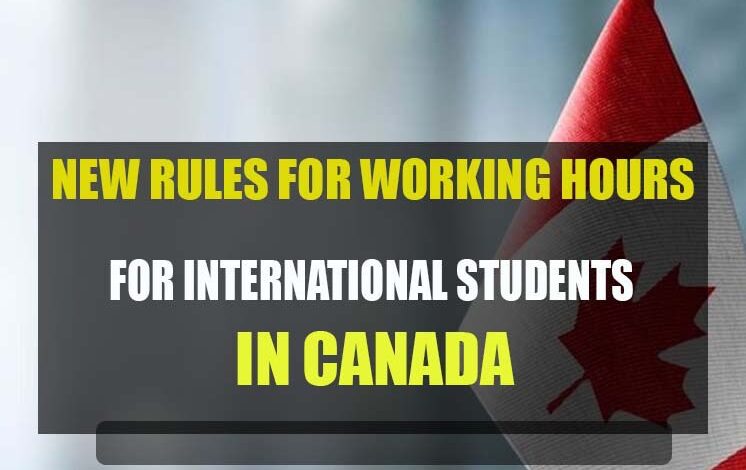New Rules for Working Hours for International Students in Canada

New Rules for Working Hours for International Students in Canada
In this blog, we’ll talk about the new guidelines for working hours for international students in Canada. Minister Mark Miller provided important updates on Canada’s off-campus working laws for overseas students today.
The minister revealed plans to raise the maximum amount of time that can be spent working off-campus from 20 to 24 hours per week, beginning in September 2024, during a media briefing in the foyer of the House of Commons. This move demonstrates the government’s commitment to accommodating the needs of international students while also taking labor market dynamics into account.
At a media availability, Minister Mark Miller discussed new regulations about international students’ off-campus work hours in Canada. At 1:00 p.m. EDT Toronto time, the minister convened a media scrum in the Canadian House of Commons foyer. Minister Miller declares that starting in September 2024, international students’ off-campus employment hours during class would increase from 20 to 24 hours.
Up until September, when the government can permanently change it to make it 24 hours, the work week restriction will be limited to 20 hours. Overseas students are not limited in how many hours they can work during the summer and winter breaks.
Minister Miller’s Announce New Rules for International Students
“I’m here to discuss the changes to international students’ off-campus work hours that will take effect in the coming months. I also want to highlight how we’re working with our partners, which include learning institutions, provinces, and territories, to improve the integrity of the international student program and to put in place regulations to ensure that students are successful and supported in Canada.”
We removed the 20-hour weekly cap on off-campus work for overseas students in October 2022. We were still getting over the pandemic at the time. Companies struggled to fill employment, and rising fees were causing hardship for many students. It was crucial to raise this barrier to support small enterprises, local economies, and international students.
I declared in December that that policy would be extended, permitting overseas students to work an unlimited number of hours off campus. I didn’t want to put some students in severe financial situations by making the modifications in the middle of the study year. But the policy will not be renewed; it expires today. Since it was effective in aiding in the recovery of our economy from the epidemic, it is no longer required.
The majority of students, who are just finishing their academic year and intend to work through the summer, won’t be impacted by the changes I’m about to make because they are already permitted to work an unlimited number of hours during school breaks as long as they meet the requirements outlined in their study licenses.
However, research has demonstrated that working longer hours while enrolled in postsecondary education can hurt academic performance and raise the likelihood that students would drop out of their programs. To ensure that international students are successful and are enrolled in classes as scheduled, we must support them.
When examining Best Practices and policies in other similar nations, the majority of them restrict the amount of hours that overseas students can work. Canada’s regulations must be in line or else more and more applicants who are primarily interested in working rather than studying will apply to our programs.
Additionally, we aim to keep up with the research and enhance the program’s overall integrity for overseas students. To be clear, studying is the main goal of the program for overseas students—not working. Because most shifts are eight hours long, we plan to implement permanent adjustments that will allow overseas students to work off-campus for up to 24 hours. We hope to have this in place by the fall.
The New 24-Hour Rule
Students may work up to three shifts each week under the new 24-hour rule. After April 30, 2024, the current temporary full-time job policy will not be renewed. This is the Minister’s explanation for the schedule change that will take place in the fall of 2024: 24 hours per week as opposed to 30.
Working Hours for International Students in Canada
The purpose of Minister Miller’s media availability is to clarify the government’s position on whether or not to extend the temporary policy that permits some international students to work off campus for more than 20 hours per week, as the full-time working out-of-hours policy is scheduled to expire on April 30.
To ensure that Canadian businesses can meet the workforce shortfall and that overseas students may earn more money to support themselves, a temporary regulation was developed in response to the COVID-19 pandemic. A small group of foreign students agreed to work full-time through April 30.
It is unlikely that this policy about full-time working hours will be further extended after April 30. Please refer to the standards for full-time employment as we posted on April 18. The IRCC did note that they are thinking about solutions for the future, like raising the cap on the number of hours that students can work off campus to thirty per week. Positively, we may anticipate that the Immigration Minister will declare the creation of a work policy of about 30 hours per week.
In general, while classes are in session, international students in Canada are permitted to work up to 20 hours a week. It has long been expected that Canada would extend these working hours to thirty hours per week for foreign students studying there. With his decision, Minister Miller has made a significant policy change that will affect thousands of overseas students studying in Canada.
Watch this space for additional updates on this developing problem that impacts the lives and experiences of students across.
Visit https://theghupdates.com/ for the latest updates on visas, scholarships, work permits, and sponsored jobs



